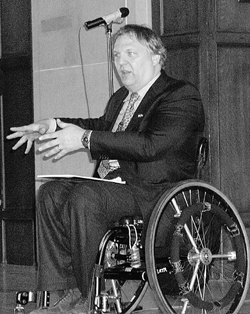By Noël Rozny

By developing a fear of the Islamic world, we are blinded to the connections between our societies, John Hockenberry told an audience of faculty, students and staff March 26. Hockenberry, a “Dateline NBC” correspondent, visited campus to discuss the way diversity affects national and international events such as 9/11.
He began the evening’s lecture with stories of his twin daughters, Zoe and Olivia. While one twin became mobile by walking, the other initially preferred to use her father’s wheelchair to move around. Hockenberry says the different responses of twins who grew up in the same environment shows how “the mind is capable of working with all kinds of interfaces.”
Hockenberry knows firsthand the mind’s ability to change and adapt to diversity. While studying at the University of Chicago, he lost the use of his legs in a car accident. “The interesting thing about disability is it presents a problem, it poses a question,” he explained. He views his disability not as a disadvantage, but as something to which he has adjusted.
Not everyone responds to the question of disability and diversity in the same way. According to Hockenberry, people can respond to diversity “out of fear or embrace change and attempt to learn what its meaning is.”
Hockenberry explained that ‘there wasn’t much of a basis of knowledge from which Americans could begin to evaluate who [Osama] bin Laden was, why groups were doing this, what had happened, where does this hatred of America come from.” He said Americans need to become better educated about international events, so they can respond to diversity out of knowledge instead of fear.
“I’m not one for gratuitous sentimentality on television,” Hockenberry said. He criticized the national media for playing up the emotional aspects of 9/11, while ignoring the important international issues. “I think in that situation, where people are basically ignorant of those sorts of international issues, that you gravitate toward [stories about] the firemen,” he explains.
“I made the decision very early on, I will focus on what I thought was the really meaningful elements of the story: Al Queda, who they are, the mechanisms of terror, the Saudi Arabian nation, “ he said. Although it was difficult to get his international stories on the air, he “felt that the grief of the firefighters was private” and that his audience needed more comprehensive information.
Hockenberry traveled to Saudi Arabia to interview family members of terrorists who died on Sept. 11 and connected their emotions to the response of family members of the Columbine High School shooters. Although he initially expected his interviewee to deny his brothers’ involvement in the terrorist acts, Hockenberry found that “he was very candidly and freely [open] to a discussion of the shock his family had felt of losing two brothers—not unlike the shock and puzzlement we see on the faces of American family members of some of the school shooters in high schools,” he explained.
“We’re entering a very terrifying new phase that demands vigilance on the part of all of us,” he cautioned audience members as the evening drew to a close.
Hockenberry, who worked for National Public Radio for 15 years before moving to NBC, has won two Peabody Awards, two Emmys and an Edward R. Murrow Award. He also has written two books: a memoir, “Moving Violations: War Zones, Wheelchairs and Declarations of Independence,” and a novel, “River Out of Eden.”
“An Evening with John Hockenberry” was sponsored by the University Library Diversity Committee, Friends of the University Library, the Office of the Provost, the Office of the Vice President for Communications, the Office of the Vice President for Government Relations, Services for Students with Disabilities, the Adam Miller Fund, the School of Art and Design, and the School of Social Work.

